The Eye Test: Late Adjustments Were No Problem for UCLA Football Against UC Berkeley
It's hard to properly grade this game given the circumstances surrounding it.
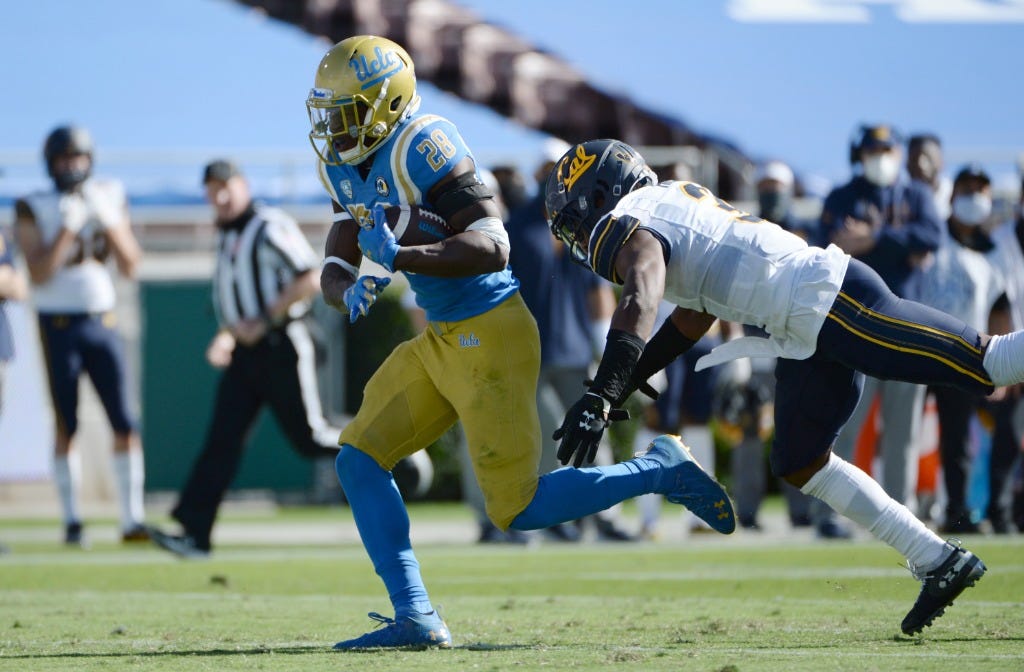
This…this will be a weird one.
We knew heading into the 2020 football season that things were going to be difficult. After all, we’ve got a ton of colleges trying to put on a football season in the middle of a pandemic with varying degrees of safety protocols in place. So, it was bound to be bumpy. Last weekend, 15 different games across multiple conferences were postponed or canceled with this coming weekend already up to five games similarly not happening. UCLA was one of those games as their initially-scheduled meeting with Utah was pushed back from Friday to Saturday and, then eventually postponed, as the Utes continue to deal with a COVID outbreak that has left them below the minimum threshold.
Fortunately for the Bruins, there was another team in the conference in a similar boat, as UC Berkeley had its game against Arizona State canceled after reports came out that the virus was running rampant through the Sun Devils. The Pac-12 acted quickly and decisively in moving schedules around to allow UCLA and UC Berkeley to continue their rivalry and the conference should be credited for it.
But those circumstances also make it difficult to really grade this game. For starters, both teams only had two days of time to actually game plan for their opponent. An ESPN+ article does give hints that both Berkeley and UCLA had some level of belief that they could be playing each other, but UCLA was practicing as late as Friday morning under the belief they would be playing the Utes, while the Bears were prepping for two potential opponents that day.
Then, consider that this was Berkeley’s first game of the year. They had their previous game canceled due to a COVID outbreak. It’s important to note that they were the offending team the first go-round and the resultant quarantine had essentially kept their offensive and defensive lines apart for the past two weeks. Their quarantine literally ended Sunday morning, so they really had not been able to have practices on the same level as the Bruins, who already had a game under their belts and (theoretically) better understand their particular strengths and weaknesses.
Added together, it creates a situation where one has to wonder what was real and what was fake. There are two statements that you could make following this game:
UCLA looked much improved from their opener.
UC Berkeley looked like a team that had not really practiced in a few weeks.
Both of those statements are true and do not contradict each other. It puts us in a spot of trying to figure out if those improvements are real, or just a product of circumstance, which is an uncomfortable position to be in considering everything else surrounding this program.
And, so, the Eye Test trudges on. This week’s grades tended to lean towards the more optimistic side, but feel free to take everything here with a grain of salt. It’s probably safer that way.
OFFENSE
Quarterback: B+
Well, look at that.
I don’t want to toot my own horn too much, but I stated last week that Dorian Thompson-Robinson can be a good quarterback when put into a system that takes advantage of his skillset and, lo and behold, UCLA did exactly that this week, resulting in an easy win. Now, this is not to say DTR was amazing on the day — he did have an early bad interception and fell back on some bad habits regarding running backward when faced with pressure — but, in general, he was solid, throwing for 196 yards and three touchdowns for a 147.6 passer rating. Most importantly, Thompson-Robinson carried the ball 12 times for 52 yards. He didn’t take one to the house like we saw last week, but he was involved early and often in the running game, which forced Berkeley to have to account for him, thus freeing up the running backs.
Honestly, this is the type of performance I don’t have many notes on. When DTR plays solid football, UCLA tends to have a chance to win and, for the first time in a long time, he was put in a position to perform at that level. There are still some flaws in his game, and I don’t think he will ever become the pocket passer that Chip Kelly so desperately wants him to be, but there’s enough talent here that he can be great in his own right.
Running Back: A
This was an excellent game from the running back group, which seems to have finally found its two-headed hydra tandem in Demetric Felton and Brittain Brown. Felton was his normal self, breaking the 100-yard mark running while adding three catches for 28 yards. He’s such a threat all over the field that it was more surprising to see him get 25 carries, with the vast majority coming from the pistol set. UCLA wasn’t really creative in how they got him the ball, which is a good sign since Felton was still productive.
Brown, meanwhile, had a solid game. He’s a much bigger back than Felton and acts as a great complement because he is so physical with his runs. Brown very much acted like a physical closer during this game and nothing stood out more than UCLA’s final touchdown drive, where the Bruins exclusively ran the ball. Felton took the first six carries, picking up two first downs in the process, at which point Brown came in and broke the spirits of the Berkeley defense with two powerful runs, the second of which broke through multiple Bear defenders en route to a 31-yard touchdown run. This feels like a dynamic 1-2 punch, should the Bruins continue to utilize it (considering Brown only saw one touch against Colorado, that’s an open question!).
Also a quick shout out to both Kazmeir Allen and Keegan Jones, who are making an impression with their few opportunities. I’ve reached the point where I wouldn’t be opposed to seeing more of Allen involved in the game plan, while Jones looks like a long-term rotation piece at the very least.
Receivers: A
This is a bit of a cheat of a grade since the receivers didn’t have to do much in this game. UCLA clearly wanted to attack Berkeley on the ground and Thompson-Robinson didn’t have the greatest day throwing the ball. So, the grade is more reflective of the fact that the receivers did their job when called upon. Shout-outs go to Greg Dulcich, who increasingly looks like an NFL-level tight end, and to Charles Njoku, who looked really good in taking his first collegiate reception and making it a touchdown.
Offensive Line: B+
Credit goes where credit is due: the offensive line was much improved in this game. As mentioned in the opening, it’s hard to know how much of that is due to their own work and how much is due to Berkeley’s defensive line having gone multiple weeks without meaningful practice, but the end result was one of the better offensive line performances in the Chip Kelly era.
First off, it should be noted that UCLA appears stable at both tackles spots. Sean Rhyan has, predictably, been great, but Alec Anderson deserves a lot of credit for pinning that right tackle spot down and looking good while doing so. Having that level of security bookending the line is a gift that the Bruins will hopefully capitalize on in the next few years.
The interior of the line played much better as well. Duke Clemens shook off a poor opening game and looked closer to his 2019 form, while Sam Marrazzo was steady at center (minus a bad snap that seemed like miscommunication than anything else). The left guard spot, which has seen some rotations this year, was capably handled, as Paul Grattan looked like he had his legs underneath him this game. I especially liked what I saw from Atonio Mafi, who was on the field during UCLA’s final touchdown run. Mafi had a mean streak in him on his blocks, and he was repeatedly throwing guys to the side on that drive.
Pass protection was….a bit more iffy. It wasn’t as bad as the previous game, but there were too many times where a Berkeley defender was able to get into the backfield in a hurry. The good news here is that the Bears should, theoretically, be one of the better defensive fronts this team will face all year.
Overall: A-
Here’s a weird thing: I think UCLA played a little bit worse offensively in this game compared to Colorado, but at the same time it never felt like they did not have the game in hand. And I think that speaks more to how good UCLA looked in that second quarter, where they poured in 20 points and essentially sealed things. The Bruins were extremely efficient when the game was in doubt, and I don’t know how much things would have changed had Berkeley been better on offense. The Bruins took their foot off the gas pedal in the second half, which is understandable when up 17 and, later, 24 points, and even then UCLA was getting good drives into Bears territory that ended on downs. The one thing the offense was missing from Colorado was the explosive plays, but there was never a true need for them here and the Bruins had enough explosive plays to keep Berkeley honest on defense.
Like I’ve mentioned, caveats do apply considering this Berkeley defense is playing its first game after missing weeks of real practice and is trying to replace some key pieces from last year. And the reason this isn’t an A grade is small dings from the opening few drives (that interception gave me deja vu in the worst way) plus weaker execution in the second half, but overall it’s hard not to feel good about this performance. I have a few more thoughts on it, but they’ll be saved for the Coaching section.
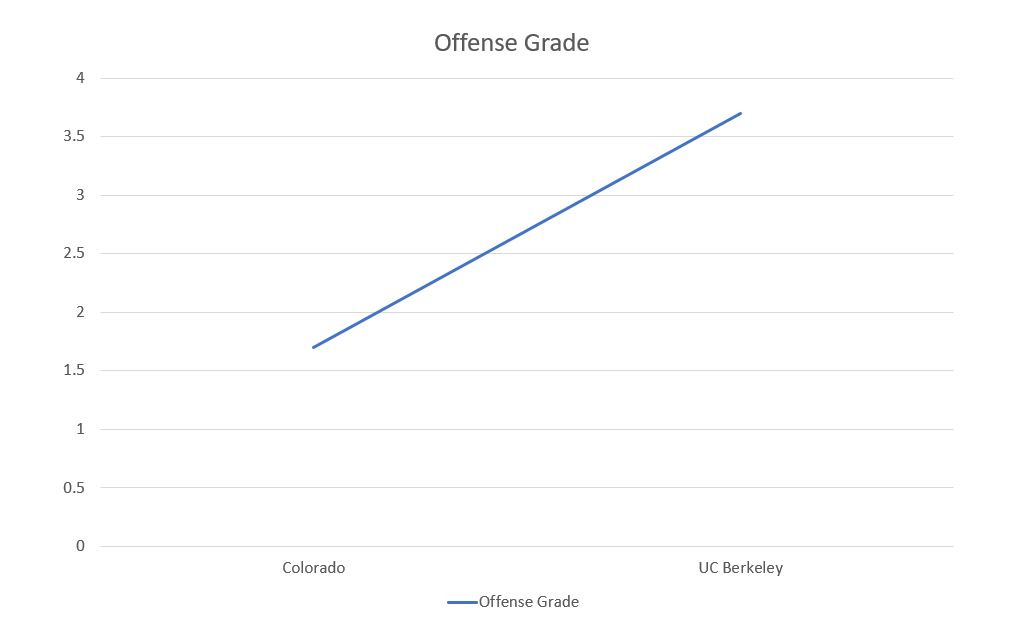
DEFENSE
Run Defense: A
Berkeley could not run the ball. At all.
They certainly tried! The Bears ended up with 28 rushing attempts on the day, but they ended up with only 82 sack-adjusted yards. Bill Musgrave (more on HIM in a bit) clearly wanted to run the ball and UCLA’s defenders were not having it.
Credit goes to the D-Line here, which stepped up huge after a rough first game. Osa Odighizuwa was a monster in the middle and he was joined by Mitchell Agude, who is looking really impactful for a true freshman. The improved defensive line play made things easier for the linebackers, especially OLB/rush end Datona Jackson, who essentially lived in the Bears’ backfield.
Pass Defense: A
That continues into pass defense, as the defensive line did a great job of generating pressure with a mix of stunts and pre-snap shifts. The Bruins ended up with five sacks on the day, and none of them were of the coverage variety, which bodes well.
One of the more fascinating things on defense has been the usage of Carl Jones and Qwuantrezz Knight. The assumption going into the season was that Jones would take the Striker/nickel position he had won last year, with Knight acting as his primary backup. In actuality, UCLA recognized how talented both players are and have shifted personnel around to get them both on the field. Knight now occupies that Striker spot, while Jones was shifted into more of an OLB/rush end that can drop into coverage.
The result has been some impressive defensive football. Knight has perhaps established himself as the best player on the defense at the moment and he was flying all over the field, coming up to rush the quarterback and picking up a sack, while also dropping back and breaking up passes. Jones has been quietly great as well, as he had a knack for generating pressure when called upon while being solid in coverage. Moving Jones into this spot also takes the pressure off the other linebackers, simply because he is able to cover up so many of their flaws. Add in Caleb Johnson here, who had 1.5 sacks and came up with the Bruins’ lone interception of the season, and UCLA has found a rock to build on defensively.
The secondary itself played fine. Chase Garbers is not a great quarterback by any stretch and the defensive line made things difficult, but the secondary held up when called upon. Jaylen Shaw had an impressive outing, while Mo Osling looks like he’s ready to take over the opposite corner slot. Safety play was much improved compared to last week as Quentin Lake had a return to form while Stephen Blaylock seemed to get back in rhythm.
Overall: A-
*walks up to the mic, calmly grabs it, and prepares to drop a hot take*
Yo Bill Musgrave is bad.
*drops mic, crowd goes mild*
I’m forever going to side-eye the hire of a career NFL coach at the college level, especially so when it’s a coach with Musgrave’s track record of impressively average performances. I’m going to side-eye it even more when that hire shifts the offensive philosophy of the Bears from the spread attack they’ve been using the past few years to a pro-style system, meaning Berkeley does not have great personnel to implement said system at the moment. This is ESPECIALLY problematic since Berkeley’s offense was actually pretty good by the end of last season, meaning all of their gains the past two years were just thrown away so that Musgrave can make some supremely-baffling 4th down play calls that would make even Chip Kelly blush.
That’s basically what’s hurting this grade. As good as the UCLA defense looked in this game (and they looked really good!) I have to ding them because, on some level, UCLA was able to succeed because they were playing against an opponent that is purposefully handicapping itself. If there were actual improvements here, then we’ll see them next week against a much better opponent.
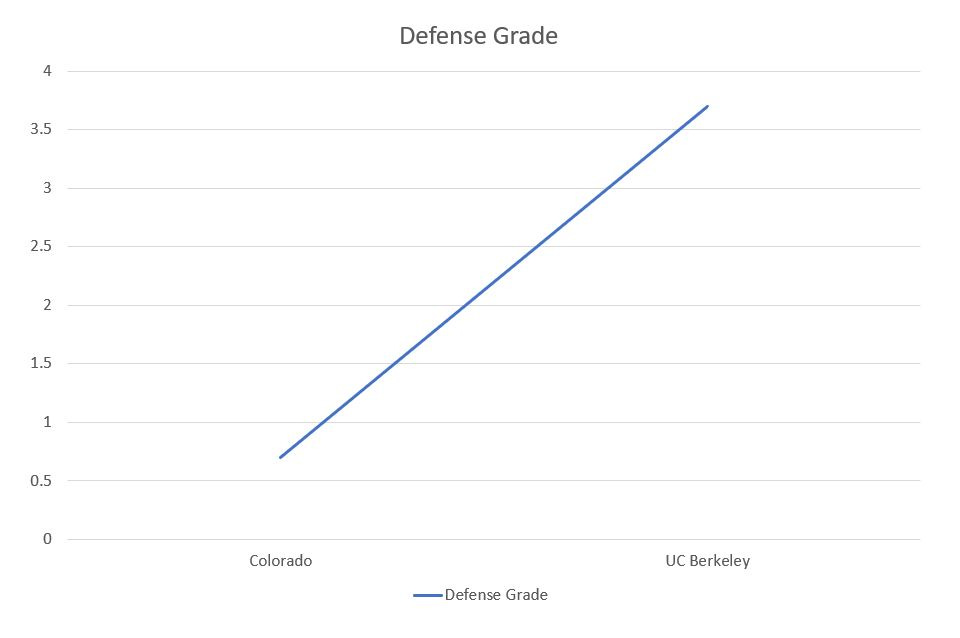
SPECIAL TEAMS
Overall: C-
When you don’t have many opportunities, the poor moments stand out more. Luke Akers had a punt blocked which set up Berkeley’s first points of the day, while Nick Barr-Mira missed one of his five extra-point attempts. Not particularly great, but they didn’t end up costly.
I think I would have liked to see Chip Kelly give Barr-Mira an opportunity at some field goals late in this game, just to get him the experience. But it feels like a concerted effort by the coaching staff to keep going for it on 4th down in favorable positions and that’s basically what UCLA found itself in on each attempt.
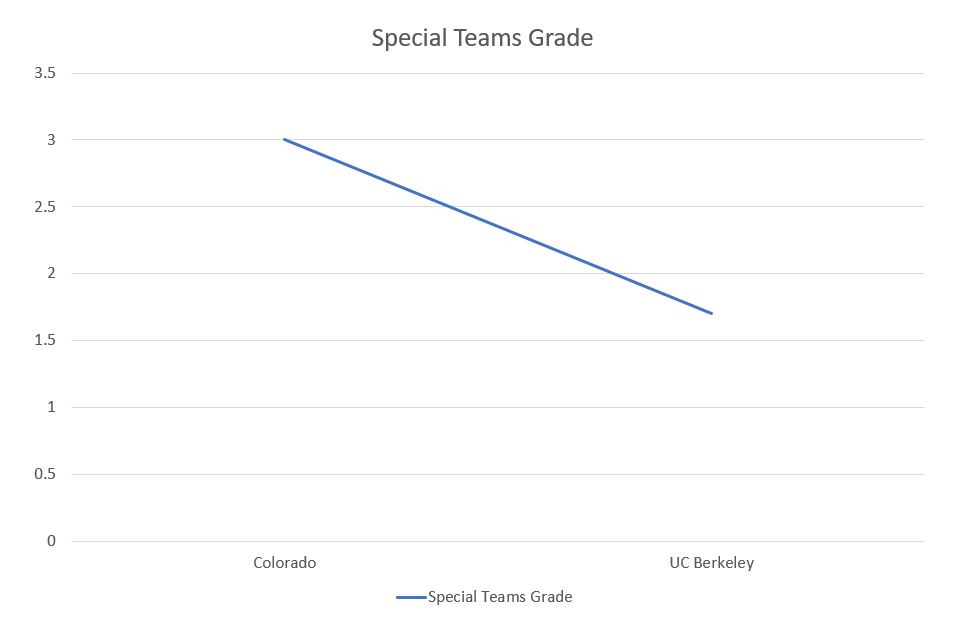
COACHING
Offensive Game Plan: A-
Allow me to be optimistic for just one moment and believe that we’ve finally seen the last of Chip Kelly’s “multiple” offense that falls in love with long-developing pass plays and power sets and, instead of that, he is finally willing to shift to an offense closer to the Blur that we saw in Oregon.
The thing is, UCLA’s current personnel fits into the Blur scheme pretty well. They have a great athletic quarterback who is at his best in space, a stable of running backs that mix size and speed, and receivers that have speed on the outside but can bully you down the middle. The offensive line even appears more suited to run blocking at the moment. Throw in that the team is well-conditioned (one of the persistent bright spots under Kelly) and you end up with a game like this one, where the Bruin offense thrived when it utilized tempo and zone reads to race out to a commanding lead.
My fear here is that this was an aberration brought on by the necessities of the opponent shift. UCLA in the second half started to slow things down, which inevitably led to Berkeley’s defense finding more success and, now, I have to hope that Kelly sees the success he’s had and continues to utilize it, which is the worst thing to hope for with a coach in the middle of his third season in charge.
Defensive Game Plan: A
Meanwhile, I have no problems with the defensive game plan.
In fact, let me just quote myself from the post-game article on Sunday:
Despite all that, the UCLA defense looked very good in this game. They were much more aggressive than they were against Colorado, and that aggressiveness was rewarded repeatedly with sacks and tackles for loss aplenty. The Bruins even forced their first turnover of the year on a tipped ball interception for Caleb Johnson, which set up a UCLA touchdown in the first half. UC Berkeley was unable to gain anything in the way of offensive momentum all game, and for UCLA fans, this was closer to the expectations when Brian Norwood was hired to help implement his more aggressive 4-2-5 scheme in Westwood. A UCLA defense that shows this level of aggression, even if it gets burned on occasion, would give the team a much higher chance of success.
UCLA was aggressive upfront, sending multiple and varied looks at the Berkeley offensive line all game, and creating havoc at all three levels of the field. That’s a really good thing to have at the college level, where you’re going to have opponents with varying skill levels. Plus, an aggressive defense helps out the offense, because while it is more possible to be burned, it also creates greater opportunities to force turnovers or get off the field quicker.
The death by 1000 cuts defense was clearly not working. Here’s hoping Norwood’s style wins out going forward.
Overall: A
There’s a thought that the opening game of the season is the biggest test of a coaching staff because they have to prepare for an opponent using game tape from the previous year while getting players ready without injury. It’s as close to an even playing field as you can get in a college season.
Well, we found an even better test of a coaching staff: how well you can prepare your team to face an opponent with only two days’ notice. And Chip Kelly and his staff passed that test with flying colors.
Going into halftime, the prevailing thought in my head was how much better UCLA looked than Berkeley. Now, obviously, caveat caveat caveat with the Bears having not played a game yet, but even so, the Bruins looked light-years improved from their opening performance against Colorado. With so little time to prepare, it meant the coaching staff simplified things down to some base concepts and that strategy worked perfectly.
In fact, it worked so perfectly that the joke amongst UCLA fans was that we should just not tell Chip Kelly who his opponent is until a few days prior to kickoff. The best jokes have a kernel of truth to them and, in this case, it’s the depressing that UCLA can look so good with so little prep while looking awful after a week+ of time to prepare. If UCLA can keep up the momentum from this game, then awesome! Things have finally turned the corner. But the track record of this staff means fans will remain guarded for the foreseeable future.
PREPAREDNESS
Overall: Pass/Fail
UCLA won a game handily despite having only two days to prep. There is no possible way this grade wasn’t going to be a Pass.
FINAL COMPOSITE
Offense grade: A- (3.7)
Defense grade: A- (3.7)
Special Teams grade: C- (1.7)
Coaching grade: A (4.0)
Preparedness grade: Pass/Fail
Final grade for UC Berkeley Golden Bears: A- (3.28)
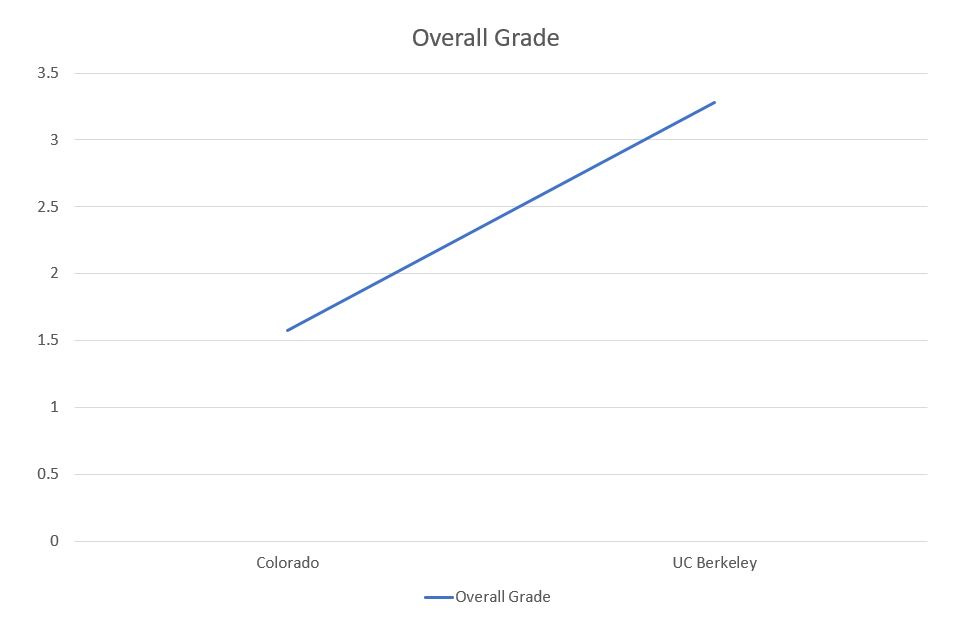
Our previous grades:
Once again, the Preparedness stat comes through by bumping up the letter grade, as the number was closer to a B+. And, in general, an A- feels correct, especially with all the unknowns surrounding Berkeley.
Next up, however, comes the real test. Oregon does look like the class of a weaker-than-expected Pac-12. So, even a competitive game would look good for UCLA’s trajectory the rest of the year. And I can’t believe I’m thinking about UCLA being competitive with Oregon after that opening game.
Go Bruins!
Thanks again for supporting The Mighty Bruin. Your paid subscriptions make this site possible. Questions, comments, story ideas, angry missives and more can be sent to to @TheMightyBruin on Twitter.


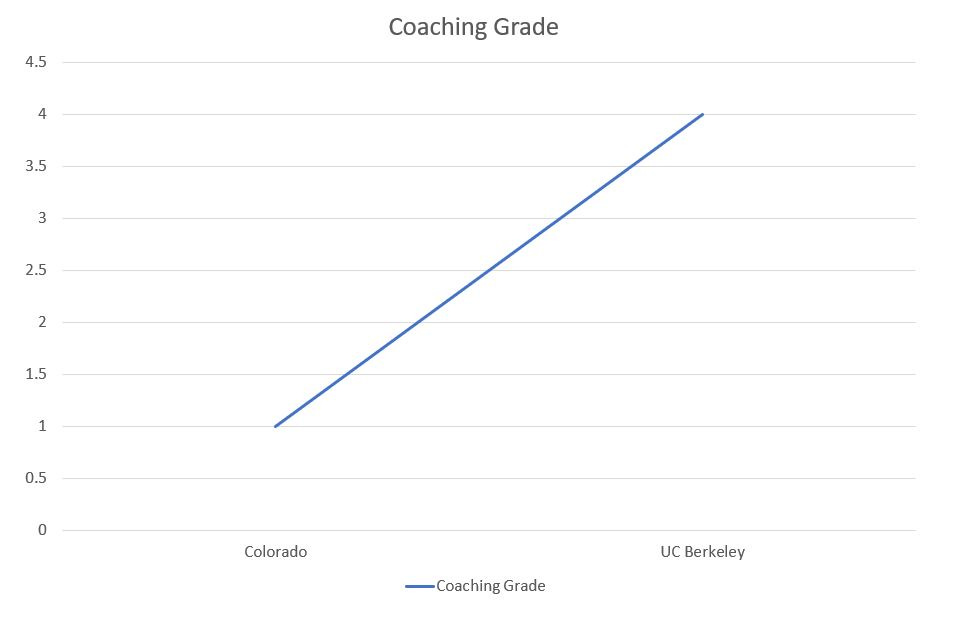
Great work, Dimitri. It’s nice to see some A’s.
I’ve learned not to disparage a good performance just because the test was too easy. I remember my first quarter at U.C.L.A. in Psych 10 with Carlos Grijalva (great prof and my favorite during my time). Dr Grijalva couldn’t attend the review session for our final, as I think his wife was having a baby, so his TA has to do it at the last minute with no prep. She was a bit overwhelmed by the situation, so in order to let us know what kind of things we could expect on the test, she essentially just read all the test questions to us.
We all did fabulously well, and the grade counted.
Opportunities like my Psych 10 final, or an overwhelmed UCB football team, don’t come along that often. Take the gift, enjoy it for a moment, and then get ready for a return to bigger challenges.